Day: October 1st, 2006
And back to nature
After such a technology-focused morning, it was time for a change of pace. We boarded the WIRED shuttle to Grand Central, and from there decided on an impulse to hop the 6, one stop past the old high school, to the original El Paso Taqueria. SYB had never been to this casual spot in El Barrio, which dishes up some of the tastiest Mexican in the city.
Inspired by my trip out there in July, we decided pretty much right away to order the spicy pork chilaquiles and the creamy, sweet horchatas. When the server asked if we’d like to start with the house special guacamole, we responded with an enthusiastic, “Sí, sí!” (Not literally.)
It was served in an authentic molcajete (the Mexican mortar traditionally carved out of a single block of porous basalt volcanic rock.) As at Sripraphai, we ordered it “medium spicy,” which delivered plenty of fiery chile kick. Excellent, addictive guacamole… at least as good as my (up until now) favorite restaurant version from Rosa Mexicano.

We walked our substantial lunches off in sunny Central Park. Again, the North End Conservatory Garden. This unseasonably warm Autumn afternoon, the Garden was playing host to several tour groups when we arrived, including one contingent of Korean nuns. Here, the Italian-style Central Garden with its crabapple tree-lined paths….
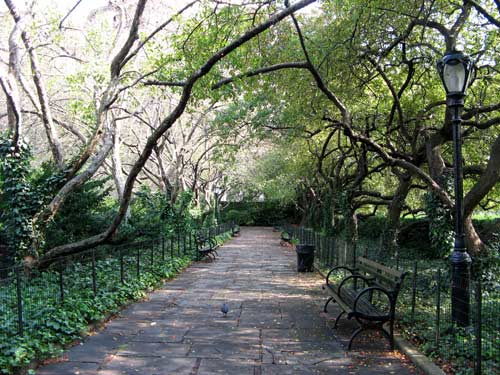
…and German sculptor Walter Schott‘s Three Dancing Maidens bronze fountain (also known as the “Untermeyer Fountain,” for the family who presented it to New York City in 1947) in the classical French-style North Garden.

We stumbled upon a happy surprise in the spray of the Central Garden’s geyser.
American ballad standard “I’m Always Chasing Rainbows” was written by Harry Carroll in 1918, and performed most memorably by Judy Garland (in 1941) and revived by Perry Como (in 1946.) Many casual listeners do not know that the song lifts its melody from Chopin’s Fantasie Impromptu Op. 66 in C-Sharp minor. It’s a breathtaking piece, which I had to master back in my piano competition days, so I suggest you listen though the entire four and half minutes. But you can jump to the referenced segment beginning at about the 1:00 mark.
I’m always chasing rainbows
Watching clouds drifting by
My dreams are just like all my schemes
Ending in the sky
On the way home, the Safari Playground, and 2 of its 13 hippopotamuses — or is that: hippopotami?
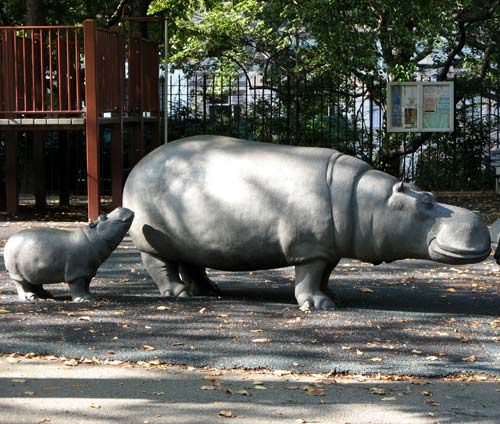
WIRED NextFest
WIRED Magazine’s NextFest (or perhaps more aptly: “NerdFest” – yep, beat you to it, wise guys) took place at the Jacob K. Javits Convention Center September 29 through October 1. The event was billed as “WIRED’s vision of a new world’s fair” — a four-day festival of innovative products and technologies. Featured were over 130 interactive exhibits from leading scientists and researchers around the world, showcasing “the future of exploration, entertainment, transportation, health, communication, design, security, and green living.”
WIRED had arranged for shuttle buses from Union Square, Grand Central and Penn Station to transport fest attendees reluctant to make the somewhat gritty trek from the nearest subway station to the Far West Side of Manhattan. We caught one of the early buses, arriving at the I.M. Pei–designed glass-walled convention center shortly after the festival opened its doors on the final day.
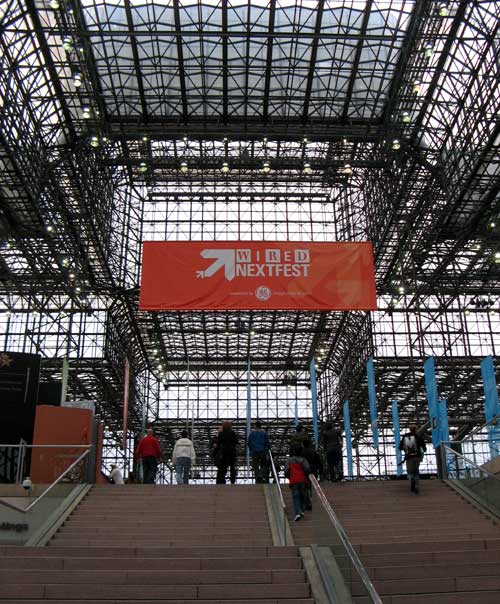
As was to be expected, the crowd was predominantly young and male. Less expected were the passels of grade school kids, whose parents had brought them by to wander among the many, many cool exhibits. With all the flashing lights, spinning and moving parts, blips and beeps, it was complete sensory overload in the atrium. And as if that weren’t enough stimulation, the Coca-Cola BlaK reps were there, handing out bottles of their brew, ensuring that everyone remained appropriately hyper-caffeinated. It’s Coke… with coffee! (The “carbonated fusion beverage,” introduced to the U.S. in April, contains roughly double the caffeine and half the calories of regular Coke, and tastes better than it perhaps sounds on paper… er, screen.) Hard to say who was most excited: we were all like kids in a giant candy store that morning.
A small sampling…
“Circles Mirror” (Tisch School of the Arts, New York University) — a 25 square-foot “mirror” constructed of 900 overlapping disks of laminated paper, arranged in a 30 x 30 pixel matrix. The disks mechanically rotate to “reflect” the changing shadows and light picked up by a video footage. Each circle is powered by its own motor and bears 1 of 12 laser-printed patterns, ranging from light to dark.
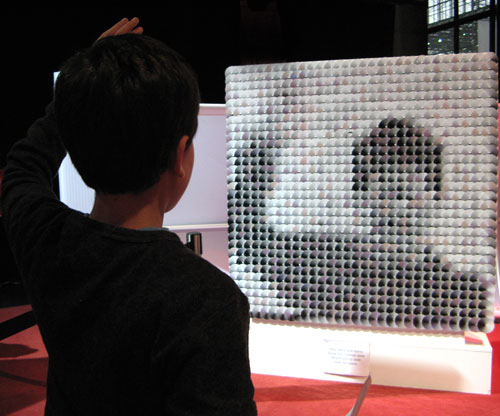
“Atari Rabbit Theater” (Violet) — an installation of 100 rabbits in a dimly lit room: talking, singing, wiggling their ears and throwing disco lights to perform an original opera.
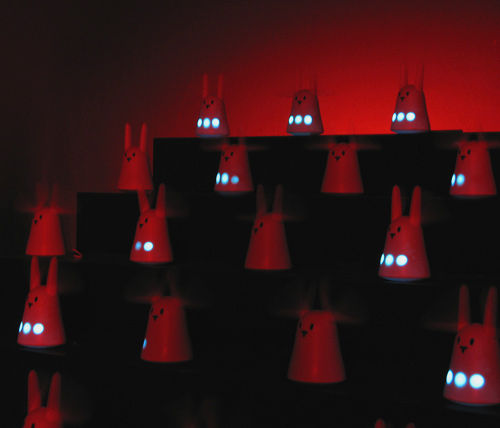
On “Robot Row”: the Albert Einstein Robot Face (Hanson Robotics) and HUBO robot body (Korea Advanced Institute of Science and Technology) — debuting the first ever walking robot with an expressive frubber face. Handlers put the robot through the motions of Tai Chi and modern dance.
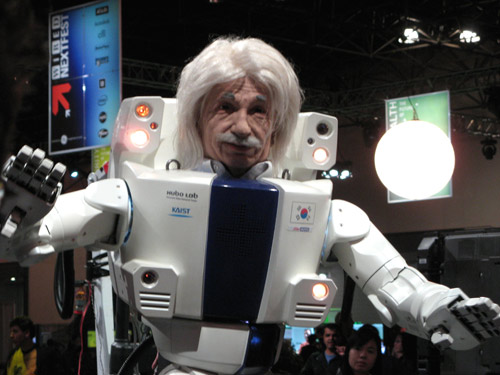
“Juke Bots” (Robot Lab, Germany) — Twin five-foot robotic arms, constructed out of KUKA industrial robots, that select and spin vinyl records on slightly modified Technics 1200 turntables. (Cool to watch, but I don’t think flesh and blood DJs need watch their backs.) The bots are programmed to perform scratch compositions and, on occasion, choreographed synchronized “dances.”
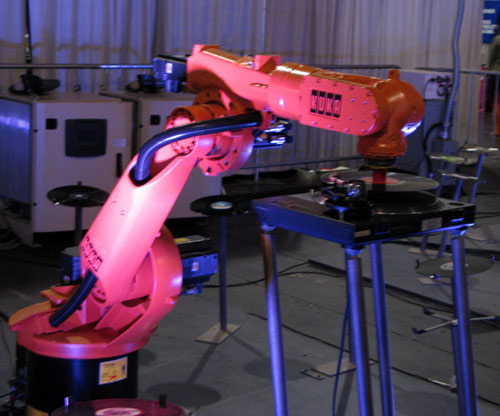
In the “The Portal” entrance, there was a “Laser Harp” exhibit by Blue Ink Studio — a large scale piece that users could “play” by using movement to manipulate virtual laser strings.
Also musical, the “Laptop Orchestra” (LIMITEAZERO): Users conduct sound and abstract video on 15 laptops by touching the corresponding stems grouped together at the podium. Lightly tapping the stem tops activate and deactivate the computers. Custom algorithms on each machine produce different sounds and shapes.
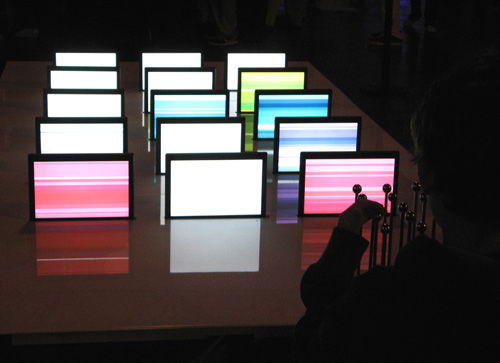
There was the eerily lifelike “Actroid Der” (Kokoro) — an android resembling a young, slim, black stretch vinyl-clad (natch) Japanese woman, capable of mimicking human facial expression, gestures and speech, and “understanding” common English and Japanese phrases.
And here, the “Partner Ballroom Dance Robot” (Tohoku University, Japan) — a battery-powered fembot equipped with force and torque sensors, capable of anticipating and matching a dance partner’s steps.
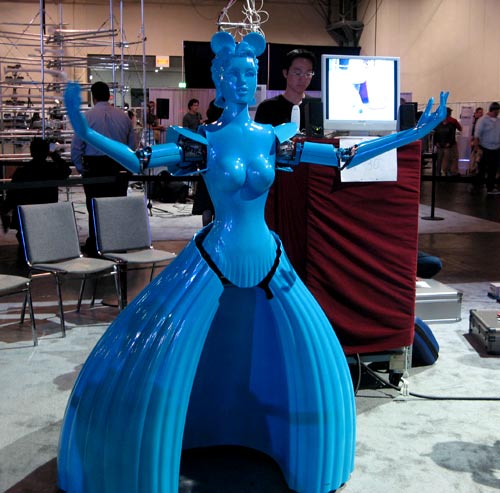
“Fogscreen” (Fogscreen Inc.) — impressively detailed images are projected onto an ultrafine vapor “screen,” which is dry to the touch.
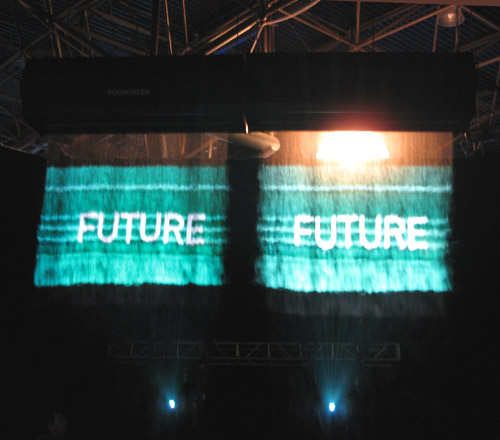
“Kick Ass Kung-Fu“! (Animaatiokone Industries) — one of the more popular exhibits. Gamers lined up for a test round of this large-scale video game, capable of inserting the user’s full body — plus any weapons he or she brought into the arena — directly into the fighting action.
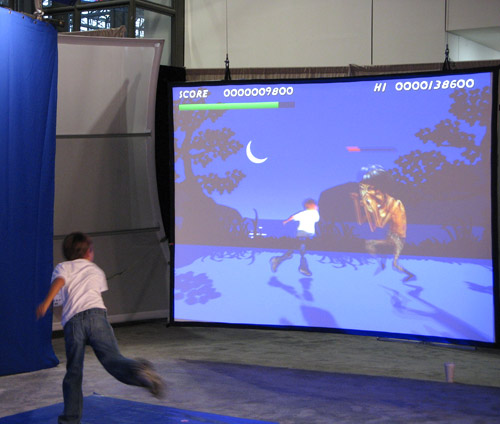
Other games on display: the more cerebral “Brainball,” (from Sweden’s Interactive Institute) in which two players, wearing brainwave-detecting headbands, face-off against each other. The headbands monitor alpha and theta brain waves, to direct movement of a ball across a special table. Cool technology, oddly applied: the design of the game counterintuitively promotes “Winning by relaxing!”: the ball moves towards less activity, not more.
“3D Display Cubes” (James Clar) — a custom built three-dimensional light installation made up of cubes of 1,000 individually controlled LED’s, soldered onto a freestanding matrix. Sparklingly beautiful, no?
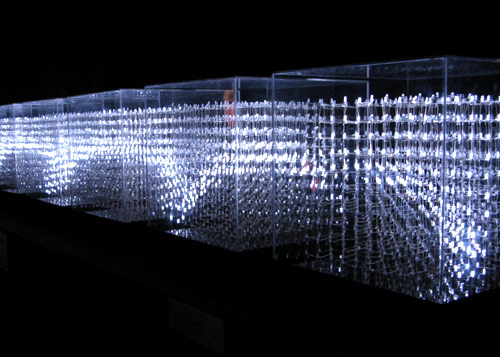
Exhibitor Con Edison donated more than 400,000 kilowatt hours of electricity, generated entirely by wind-driven machines.
Search
Popular Tags
Categories
Archive
- July 2010
- July 2009
- January 2009
- November 2008
- September 2008
- August 2008
- July 2008
- June 2008
- May 2008
- April 2008
- March 2008
- February 2008
- January 2008
- December 2007
- November 2007
- October 2007
- September 2007
- August 2007
- July 2007
- June 2007
- May 2007
- April 2007
- March 2007
- February 2007
- January 2007
- December 2006
- November 2006
- October 2006
- September 2006
- August 2006
- July 2006
- June 2006